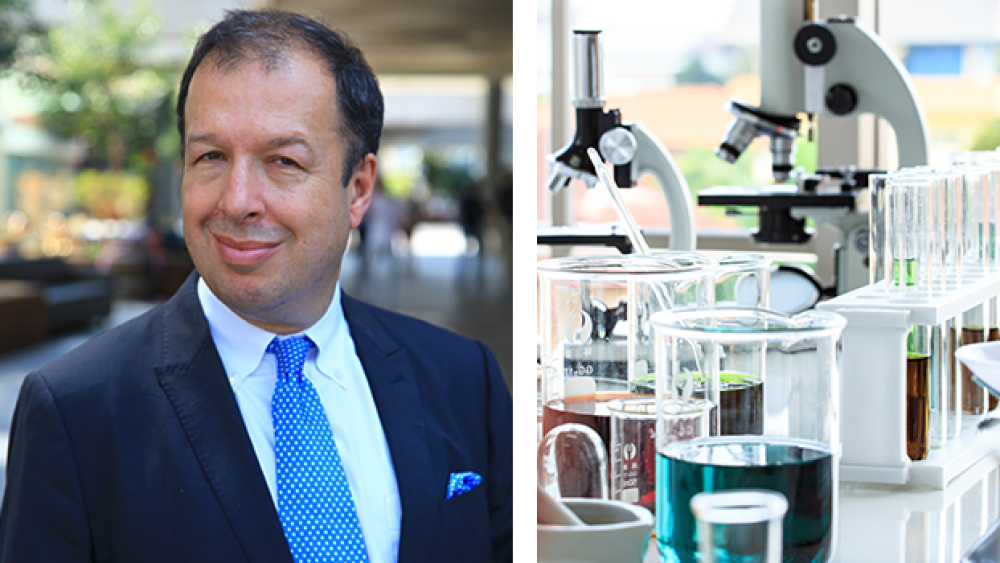Cytovia could become the first company to use a combination of natural killer (NK) cells derived from induced pluripotent stem cell (iPSC) and NK engager antibodies to treat solid tumors.
Cytovia CEO Daniel Teper/Courtesy Cytovia Therapeutics
Checkpoint inhibitors offer significant improvements in cancer care, yet even in combination with other checkpoint inhibitors or monoclonal antibodies, their results remain unsatisfactory for many.
As Daniel Teper, CEO of Cytovia Therapeutics pointed out, “The best standard of care for advanced hepatocellular carcinoma (HCC) – a combination of atezolizumab (anti-PDL1 antibody) and bevacizumab (anti-VEGF antibody) – offers less than 30% partial response and a progression-free survival of only 6.8 months.”
Cytovia is developing a new approach, possibly becoming the first company to use a combination of natural killer (NK) cells derived from induced pluripotent stem cell (iPSC) and NK engager antibodies to treat solid tumors. BioSpace spoke with Teper in advance of the company’s two poster presentations of its preclinical data at the American Association for Cancer Research (AACR) Annual Meeting, April 8-13.
“We believe that leveraging the innate immune system – natural killer cells – is crucial in fighting cancer,” Teper told BioSpace. We know that NK cells are a natural defense against the growth of cancer but, as patients’ conditions deteriorate, they have fewer and less functional NK cells. Therefore, when necessary, Cytovia can add NK cells to its NK engager antibody therapy. The company’s main program focuses on liver cancer, the fourth leading cause of cancer-related death worldwide. With those solid tumors the presence of functional NK cells has been associated with better outcomes.
“Our approach offers two ways to empower NK cells. The first is with bi-specific antibodies that we call the Flex-NK engagers. This basically redirects the patient’s NK cells to kill the tumor cells. The other is to add off-the-shelf NK cells to augment the existing army of NK cells.” Teper said he believes either of the two strategies could be effective individually in patients in the early stages of the disease, “but, taken together you get the maximal efficacy.” The presentations at AACR show preclinical validation of the two proprietary technology platforms, and also suggest the potential for synergy in the treatment of glypican-3 (GPC3)-expressing tumors and CD38-expressing multiple myeloma.
Results from other researchers support the likelihood of synergy. Teper cited Affimed, another company developing NK cell therapies. At AACR’s 2021 annual meeting, Affimed reported a small study in which combining NK cells and NK engager antibodies improved the response rate for patients with Hodgkin’s disease from about 30% for standard-of-care to 100% for two of the four patients. “That validates the concept that combining NK cells and NK-activating antibodies is a winning strategy,” Teper said.
There are two key differences between the two companies’ approaches. Affimed is doing this in Hodgkin’s disease – a hematological cancer – and Cytovia is doing this in solid tumors. Also, Affimed’s therapy is based upon NK cells from a third party. Cytovia manufacturers its NK cells from iPSCs sourced from M.D. Anderson Cancer Center. “That’s a very big difference,” Teper said.
Cytovia is working with Cellectis to edit the iPSCs for well-defined product characteristics, such as long-term stability. This allows the creation of a master cell bank that can be expanded to large volumes. Consequently, more homologous batches of NK cells can be created using this approach than is possible using autologous or donor-derived stem cells, Teper explained.
The foundational work is completed, and Cytovia is ready to scale-up production for clinical trials. “We have the process, the preclinical data and the in vivo validations. Now we’re moving to transfer our in-house manufacturing process to a GMP suite. We’re using our own teams, so this is an internal tech transfer,” which should streamline the process. While this is underway, the company also will complete additional toxicology studies this summer.
Cytovia plans to file an investigational new drug (IND) application around the end of 2022 and then begin a 60-patient Phase I/II global trial with sites in the U.S., Europe and China. The trial will be designed to evaluate the safety and efficacy of the iNK cells and the NK engager antibody individually and in combination with each other.
“Moving the overall response rate closer to 50% with improvement in progression-free survival will be revolutionary for liver cancer patients,” Teper said. “Our further goal with NK cells is to democratize treatment, so it’s available at a significantly lower cost.” He’s considering not only the cost of the drug but also the cost of hospitalization because of the side effects caused by current treatments. His target is to make the cost of NK therapy similar to the cost of biologics. Ultimately, Teper aims for this NK therapy to be available on an outpatient basis so many more patients can benefit and so costs to payers will be significantly lower than those of the first generation of cell therapies.






